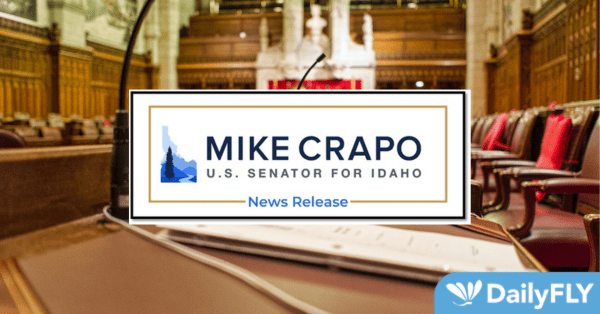Washington, D.C.–U.S. Senator Mike Crapo (R-Idaho), a member of the Senate Committee on Banking, Housing, and Urban Affairs, joined Senator Katie Britt (R-Alabama) and 15 additional Senate colleagues in introducing the Insurance Data Protection Act. This legislation would correct the Federal Insurance Office’s (FIO) recent efforts to overstep into the state-regulated insurance industry, including its proposed “Climate-Related Financial Risk Data Collection.”
“Idaho consumers do not want the federal government to have unnecessary access to their sensitive personal data, and efforts to give the federal government more power to advance its leftist climate agenda by circumventing a functioning state-regulated industry is especially egregious,” said Crapo. “We must ensure the state-regulated insurance market remains strong and will not increase burdensome data reporting that will drive up costs and threaten individuals’ sensitive information.”
The bill would eliminate the FIO Director’s subpoena authority. FIO was created in the Dodd-Frank Wall Street Reform and Consumer Protection Act with an explicit provision stating that the Office does not have general supervisory or regulatory authority over the business of insurance, which is supervised and regulated on a state-by-state basis across the United States. The legislation clarifies that FIO does not need subpoena power since it is intended to function as an informational body.
Additionally, the bill would require FIO to coordinate any data collection efforts with state insurance regulators and to assess all publicly available data and sources regarding the data being sought. These provisions would limit unnecessary data inquiries and prevent duplicative efforts across the state and federal landscapes.
Finally, the bill sets forth confidentiality procedures and requirements governing the manner in which data can be used by financial regulators if collected from insurers. This would ensure consumers’ information remains secure.
Additional co-sponsors include Senate Banking Committee Ranking Member Tim Scott (R-South Carolina), and U.S. Senators Marsha Blackburn (R-Tennessee), John Boozman (R-Arkansas), Ted Budd (R-North Carolina), Tom Cotton (R-Arkansas), Kevin Cramer (R-North Dakota), Steve Daines (R-Montana), Bill Hagerty (R-Tennessee), John Kennedy (R-Louisiana), Cynthia Lummis (R-Wyoming), Pete Ricketts (R-Nebraska), Mike Rounds (R-South Dakota), John Thune (R-South Dakota), Thom Tillis (R-North Carolina) and JD Vance (R-Ohio).
The National Association of Mutual Insurance Companies (NAMIC), American Property Casualty Insurance Association (APCIA), Association for Independent Agents (Big I), and Professional Insurance Agents (PIA) have endorsed this legislation.
The text of the bill can be viewed HERE.
Background:
- FIO is an office within the U.S. Department of the Treasury created in the Dodd Frank Act to monitor the insurance sector and help provide information to policymakers and state regulators, as needed, without regulatory authority.
- The insurance industry has been effectively regulated at the state–not federal–level for over a century.
- Despite being created to serve solely as an informational body in support of state regulators, the Biden Administration has pressured FIO to overstep into the state-regulated insurance industry, including by issuing a “Climate-Related Financial Risk Data Collection” in October 2022.
- This was requested in the President’s climate executive order, and would require over 200 private insurance companies (over 70 percent of the homeowners’ insurance market) to provide to FIO highly-detailed data (broken down by zip code) regarding the effect of climate-related catastrophes on insurance availability and affordability for Americans. On November 1st, Treasury announced its intention to move ahead with this data call.
- The data call is costly, onerous and duplicative as insurance carriers already report statewide data to their state regulators.
- FIO provided no information in its proposal as to how the data provided would be kept secure or with whom it would be shared.
- FIO also demonstrated no intention of coordinating these efforts with the National Association of Insurance Commissioners (NAIC) and state regulators, which is required under Title V of Dodd Frank.





